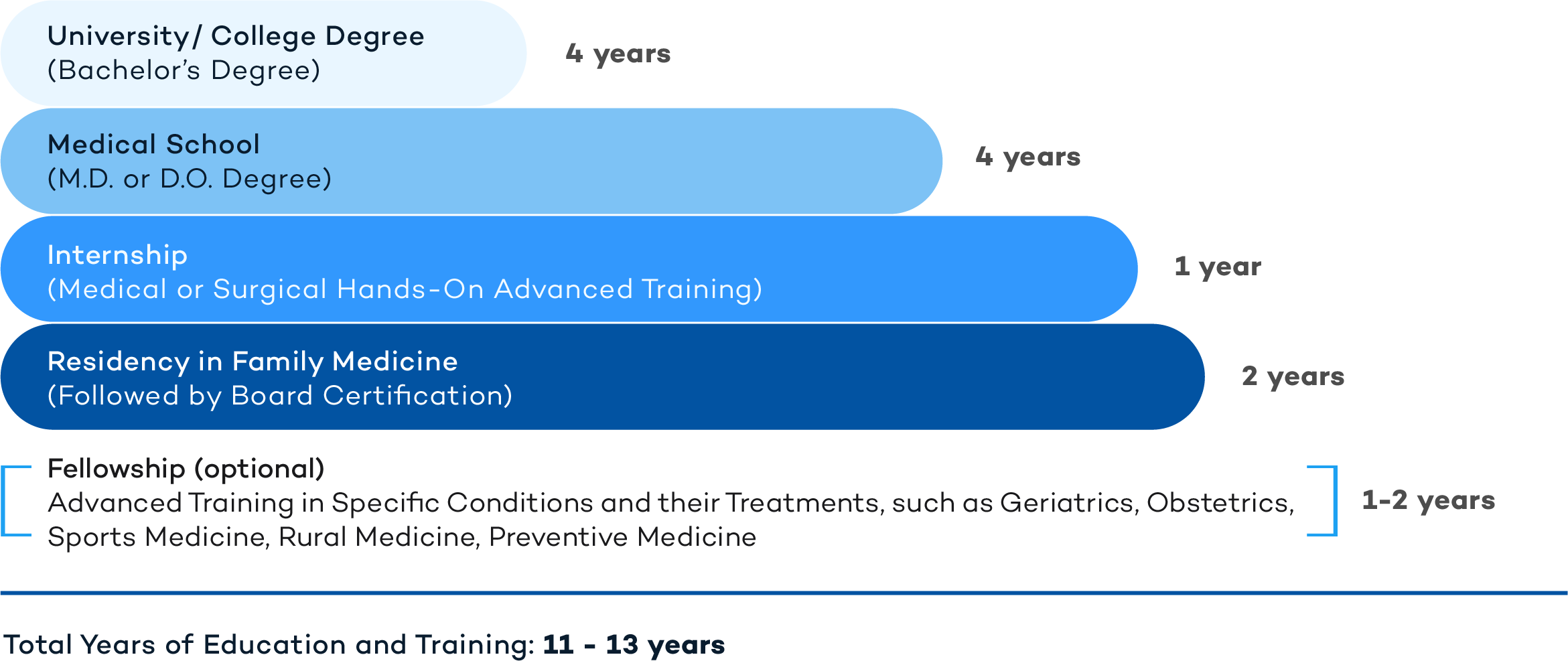

A Family Medicine Doctor is a physician who provides primary care medical services for patients of all ages. These physicians typically care for the entire family or social unit, as opposed to one particular patient group or an organ system. Family Physicians manage the entire scope of disease encountered within this unit from birth to death. Family Medicine is differentiated from Internal Medicine because of its emphasis on outpatient medicine, disease prevention, and the continuity of care from childhood through senior years.
Family Medicine Physicians coordinate care among different specialists depending upon the needs of the patient. They act as a gatekeeper and the first step towards evaluating and treating a variety of medical conditions, from acute infections or injuries to the management of chronic medical conditions.
When searching for a Family Medicine Doctor, it is very important that you choose a physician that you feel comfortable with, and are able to easily communicate with. You can do your diligence and check the credentials and practice style of the doctor with the help of your family and friends. At myDoqter, you can also search for the best Family Medicine Doctor for you and your family. Here, you have access to patients’ feedback about doctors, and you can also see the professional recommendations given by other physicians who have witnessed first-hand the expertise and professional competency of your Family Medicine Doctor.
Family Medicine Physicians are doctors (M.D. or D.O.) with advanced medical degrees and training. The following is a representation of the years of education and training that a Family Medicine Physician has undergone.

A Family Medicine Physician will treat an extensive list of conditions in patinets of all ages and genders, and throughout all stages of their lives, including:
Abdominal Pain: Abdominal pain is a common complaint in the Family Medicine office and has myriad causes which require taking a thorough history, physical examination, and possibly bloodwork and radiologic studies (like ultrasound or CT scan) for diagnosis. Common causes of abdominal discomfort include: peptic (gastric) ulcer disease, cholecystitis (inflamed gallbladder), constipation or diarrhea, irritable bowel syndrome, and gastritis.
Aches and Pains: Often the Family Medicine Physician will be the first to evaluate patients with complaints of back, neck, or shoulder pains, muscle strains, osteoarthritis in older individuals, and gout (buildup of uric acid).
Coronary Artery Disease (CAD): This term includes angina (chest pains) and congestive heart failure (inadequate heart functioning and impaired pumping efficiency). Family Medicine specialists serve a vital role in managing CAD as they monitor the medical care of the patient and follow them over time for changes in health status or physical exam findings.
Chest Pain: Non-cardiac causes of chest pain can be due to anxiety, costochondritis (inflammation of rib cartilage), or gastroesophageal reflux disease (GERD).
Depression/Anxiety: Depression and anxiety may be managed by the Family Medicine Physician with oral anti-depressant medications and/or through the arrangement of psychotherapy. Recognizing the signs of anxiety or depression are vital, especially when treating elderly patients who may be more susceptible to this condition.
Diabetes: Type II diabetes (non-insulin-dependent) is a chronic condition in which the body doesn’t produce enough insulin or has a resistance to it. Symptoms of Type II diabetes include: hunger, fatigue, thirst, frequent urination, or blurred vision.
Dysuria: This term refers to discomfort during urination. The most common causes of dysuria include cystitis (bladder infection), urethritis (inflammation of the urethra), pyelonephritis (kidney infection), a sexually transmitted disease, or prostatitis (inflammation of the prostate).
Gynecologic Problems: Gynecologic problems most often seen by a Family Medicine Physician include menstrual irregularities, menopausal syndromes, pelvic inflammatory disease, vaginitis, and contraception.
Headaches: Migraine headaches are strong headaches associated with nausea and vomiting and sensitivity to light. Migraines usually start as dull aches and progress in intensity, especially with physical activity. Migraine headaches may last for hours to days and may be followed by a stage characterized by fatigue and muscle weakness. Women are more commonly affected by migraines, and these may be associated with depression, anxiety, and sleep disorders.
Health Promotions: General health recommendations such as immunizations, weight management, well child and adult assessments, and women’s health updates are often managed by the Family Medicine Physician.
Skin Problems: These physicians manage a variety of skin issues including acne, dermatitis, eczema, viral exanthems (rashes), and many common benign (warts) and malignant (skin cancer) skin lesions.
Shortness of Breath: Two common causes of shortness of breath include chronic obstructive pulmonary disease (COPD) and asthma. These conditions may be difficult to differentiate in older populations and in those who smoke. COPD includes the progressive respiratory diseases such as chronic bronchitis and emphysema, where there is decreased air flow, as well as airway inflammation. Asthma is a narrowing of the airways due to bronchospasm and is associated with coughing, wheezing and shortness of breath. COPD is made worse by respiratory tract infections, whereas asthma is usually worsened by cold air, specific allergens or exercise.
Upper Respiratory Tract Infections: The more common upper respiratory tract infections seen in an outpatient setting include: allergic rhinitis, otitis media (ear infection), pharyngitis (sore throat), and sinusitis.
Violence: Family Medicine Physicians may be the first physicians to notice signs of domestic violence, and child or elder abuse. Identifying the signs of abuse, documenting the nature of the abuse, and reporting to the appropriate authorities/social workers are important first steps for the physician to take.
The Family Medicine Physician will be able to treat a vast array of medical conditions and will offer a range of treatment options for your particular health problem or concern. Make sure to discuss all treatment options with your physician, as well as the preventive health measures that can ensure your optimal health over time.
You can learn more about Family Medicine in the following links:
https://www.aafp.org/home.html
https://adfm.org
https://www.theabfm.org
https://www.annfammed.org